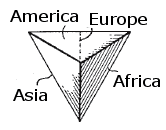Flat Earth vs. spherical Earth
is often used as an example of opposing viewpoints. However, a lot of popular propositions are all of them so
far off the mark, they could just as well be debates on whether the shape of the earth is flat or pyramidal.
Once a conflict between absurdities becomes a big thing, it can be difficult to make people see beyond the spectacular clash of horrible idea against awful idea. Take hypertext visionary
Ted Nelson, who under the heading "The huge silly controversy"
says I see almost no difference between the Macintosh and the PC.
Stunning and unheard of?
Exactly. Seeing beyond this particular conflict is perhaps especially difficult because computers are things that you buy — if no alternative is available off-the-shelf this is the same, to a consumer, as no alternatives being conceivable. The
mouse
and the
clicking
and the
icons
is simply the way of things.
Invented, you say? But it's so
natural! It's what everyone does!
When two sides of the same coin become the only viable currency like this, people tend to see everything in terms of it, leading to some very strange categorization. Returning to the hypothetical case of flat earth vs. pyramidal earth, say you came to a debate panel — perfectly balanced with equal time for 'flat' and 'pyramid' views — and said the world was round. To someone who primarily kept the farcical conflict in mind, the first thing they'd say would probably be,
Oh, right, you think it's like a flat disc? I'll chalk you up with the flat-earth
side, then.
It's as if, once a side or two has become sufficiently
elaborated, people are painted into a corner, having severe trouble
backing up
to a position where they can approach something without preconceptions or singing vikings, where they'll let you order something that doesn't have any spam in it.
What I have in mind in particular is the assumption that not carrying the card of a religion is like not wearing a caste mark. You have to wonder if this is for the benefit of people so they know which stereotype to apply to you.
If you want a mark for effort, you can approach the pyramidal-earth people and try to convince them that it's sort of like a pyramid... with
more sides. You know, like a dodecahedron, only with lots and lots of sides? If you succeed in doing anything other than disgust or confuse them, you'll then see the flat-earthers chalking up a victory against the now
fragmented
pyramid-earthers while ridiculing the minority position of a dodecahe
dumb-earth.








 I just had a really kooky thought. This was spurred by having my concept of
I just had a really kooky thought. This was spurred by having my concept of 
